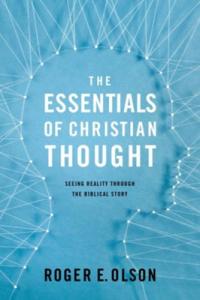Announcing a New Book Discussion
Beginning on Monday, December 18, God willing, I will begin discussion here of The Essentials of Christian Thought: Seeing Reality through the Biblical Story (Zondervan, 2017). I am the author. Here are two recommendations of the book of which I am especially proud:
“Olson offers his readers a timely and powerful defense of a distinctively Christian metaphysics and teases out its implications for theology, apologetics, and cultural dialogue. It is a rich and rewarding read and will do much to reassure its readers of the intellectual credentials of the Christian faith” (Alister E. McGrath, Andreas Idreos Professor of Science and Religion, University of Oxford)
”Just as war is too serious to be left to generals, so philosophy is too important to be left to philosophers. At least philosophy in the hands of a a theologian like roger Olson is too important to be left to philosophers. Though my understanding of philosophy is not the same as Olson’s, I learned much from his stimulating account.” (Stanley Hauerwas, Gilbert T. Rowe Emeritus Professor of Divinity and Law, Duke University)
Originally I wanted the title to be: Biblical Narrative Metaphysics, but the publisher said a book with that title would not sell. So they titled it Essentials of Christian Thought, a title I thought rather bland.
The origin of the book was a blog post here, by me. It was about the real meaning of “integration of faith and learning” in Christian colleges and universities, especially the “faith” part of that cliche. The book turned out to be much more than that although the Appendix: A Model for the Integration of Faith and Learning is that. Most of the book is about a description of what some Christian scholars have called “the biblical metaphysic.”
There is, I claim, an implicit, underlying metaphysic, a life and worldview, “hidden,” as it were, within the Bible. Not hidden as in gnosticism or New Age spirituality, but “hidden” as in “taken for granted but not explicitly expressed.”
The Introduction is titled “Why This Book.” Chapter 1 is “Knowing Christianly: Seeing Reality through the Biblical Story.” After each chapter is an “Interlude” that serves as a kind of “going deeper into the subject” appendix. Each Interlude attempts to clear up possible misunderstandings and answer objections.
It is a book explicitly for Christians. I did not intend it to be a book of Christian apologetics. Rather, I intended the book to be read by Christians who may be confused about the “philosophy” of the Bible. It constitutes an explicit exposition of what theologian Emil Brunner called a “philosophia Christiana.”
God willing, I will post my own comments about the Introduction and Chapter 1 and Interlude 1 on Monday, December 18.
If you want to join the discussion, please order the book as soon as possible. Only people who read it may comment on it. Others may ask questions.
*Note: If you choose to comment, make sure your comment is relatively brief (no more than 100 words), on topic, addressed to me, civil and respectful, not argumentative or hostile, and devoid of pictures or links.*














